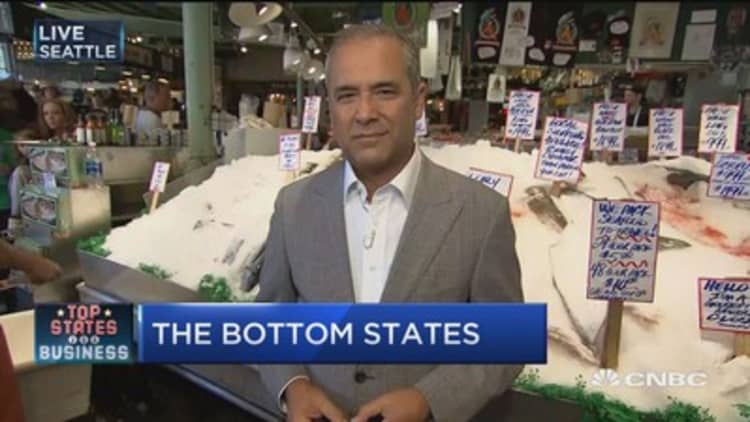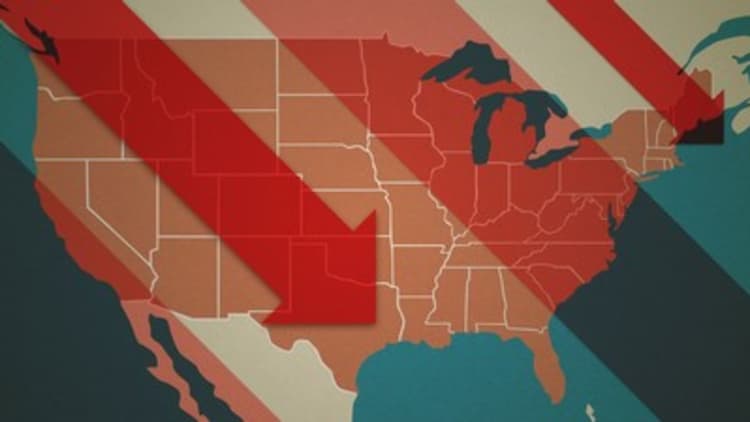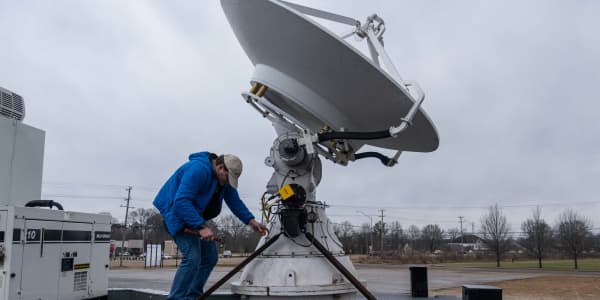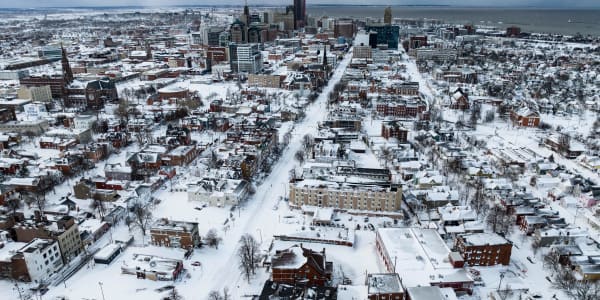
There is no mistaking West Virginia Gov. Jim Justice for anything but a local. His plain talk, delivered in a heavy drawl, is fast becoming a trademark of a governor barely six months into his first term. And the talk is often accompanied by theatrics.
Like when the Republican-controlled state legislature passed a budget this year that the Democratic governor — a billionaire businessman who owns mining and other companies —could not abide. A mere veto would not do. Instead, Justice held a news conference in the state capitol rotunda on April 13, complete with props.
"What we have is nothing more than a bunch of political bull-you-know-what," he said as he lifted the lid on a silver platter containing actual bull-you-know-what.
The stunt drew lots of laughs and plenty of attention, but in the end it meant little. Last month the legislature again passed a budget balanced with spending cuts instead of the targeted tax increases the governor preferred. Faced with the threat of a government shutdown, Justice threw in the towel, but not without one last bit of symbolism: He would let the bill become law without signing it.
"I can't possibly put my name on this," Justice said.
Such is the story of America's Bottom State for Business in 2017. West Virginia has always been known as a place where people have to work incredibly hard in order to barely get by. But with the decline of the major source of that work — coal mining — the Mountain State has in many ways become an empty symbol.
West Virginia has never done particularly well in our Top States rankings, but this year it hits bottom for the first time. The state scores a mere 942 out of 2,500 points, with the last-place economy, and finishing No. 49 for Workforce, Technology & Innovation and Business Friendliness. The state does well for Cost of Doing Business, tying for the fourth lowest. But that has more to do with stagnation than anything else.
The state is 1 of only 7 whose economies shrank in 2016. The decline in state GDP of 0.9 percent for the year was not the biggest in the nation, but West Virginia did not have much to lose. And according to U.S. Commerce Department statistics, it was almost entirely due to the decline in mining.
More from America's Top States for Business
This is America's Top State for Business in 2017
America's Worst States for Business in 2017
10 best states to find a job in America
While production has ticked up slightly from a year ago, West Virginia produces roughly half the coal it did in 2008, according to a new report from West Virginia University's Bureau for Business and Economic Research. The report predicts modest increases in production and overall stability over the next three years, followed by steady declines below 80 million tons per year through 2030 and beyond as natural gas continues to supplant coal as the major fuel source for power plants. Production peaked at around 182 million tons in 1997 and for the most part has been declining ever since, according to the West Virginia Office of Miners' Health, Safety and Training.
More troubling in terms of West Virginia's competitive prospects are the job losses that have come with declining production — and increasing automation. Overall unemployment in May was 4.5 percent, in line with the national average. But that is likely because so many West Virginians have left the workforce — some 3,000 in the last year alone, according to the U.S. Bureau of Labor Statistics. The state is 1 of only 4 that lost jobs last year, down by nearly 1 percent. Once again, the clear culprit is coal. Mining employment is down 40 percent in just the past five years, with some parts of the state losing as many as 70 percent of their coal mining jobs.
Mining employment has leveled off lately, but despite President Trump's repeated promises to "put the miners back to work," and promises from Gov. Justice to do the same, the West Virginia University researchers predict coal-mining employment will resume its decline and continue to drop for the foreseeable future. West Virginia's workforce is not the best positioned to adapt.
It is not just that the joblessness and despair are contributing to a serious drug problem — West Virginia has the highest overdose death rate in the nation, according to the Centers for Disease Control and Prevention — the problems in West Virginia's workforce go much deeper.
West Virginia workers are the least educated in the nation. Fewer than 12 percent of residents over the age of 25 have a bachelor's degree, according to the U.S. Census Bureau. And state programs to retrain dislocated workers have had limited success. Only about 72 percent of participants found work within three months, according to state figures from 2015, the most recent data available.
Despite all of that, the new state budget contains big cuts in higher education, including cuts of more than 6 percent at the state's largest public universities — West Virginia University and Marshall — and cuts of 4.6 percent at most community and technical colleges.
But Republican state Senate President Mitch Carmichael argues that the budget cuts, which total $85 million, are a difficult but necessary first step toward financial stability for the state.
"It's my hope that this responsible budget serves as the starting point for a conversation that will prove that tax reform can bring our state tremendous benefit," Carmichael wrote in a statement on June 21. "This budget provides security, certainty and fiscal responsibility to the citizens of our great state."
Whether it provides a path for West Virginia out of the depths of our rankings remains to be seen.








